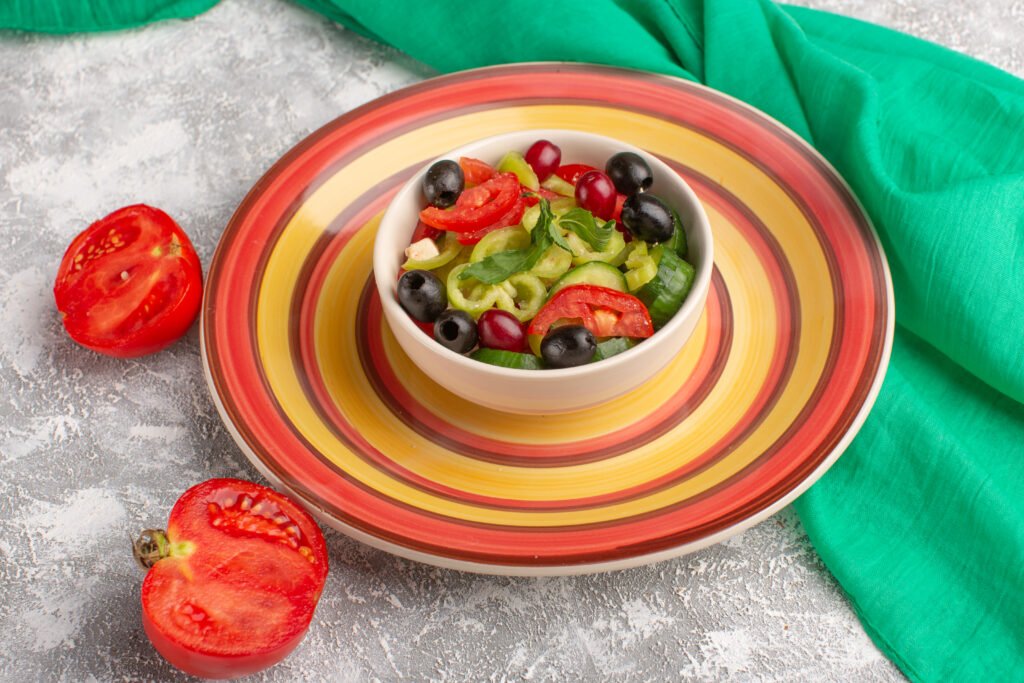Table of Contents

Introduction of Greek Salad
Greek Salad is a dish that is essentially Mediterranean. It is made up of fresh, crisp vegetables, zesty feta, and olives, which is why it offers the fresh taste that most people desire. But what makes it even more interesting is the dressing, or, in other words, the quiet ingredient that overpowers the salad to become a tasty work of art. This blog will take a closer look at the Greek salad dressing and treatments for food lovers, health-oriented people, or homemakers who are excited to make this dish.
The Basics of Greek Salad Dressing
Traditional Ingredients and Their Health Benefits
The Greek salad dressing stands on its own due to its appreciated and effective ingredients. Typically, these include olive oil, red wine vinegar, fresh lemon juice, garlic, oregano, salt, and black pepper. Each ingredient plays not just a role in contributing its taste to the dressing but health benefits as well. Say, for instance, that monounsaturated fatty acids, which are predominantly found in olive oil, make the heart healthy and reduce inflammation. Aids digestion and souring of food without sugar is red wine vinegar; using strong flavoring is lemon juice. While garlic peppers add a hint of spiciness, it is also well known for its antibacterial qualities.
Step-by-Step Guide to Making a Classic Greek Dressing
One of the simplest and most satisfying tasks that one can undertake in the kitchen is preparing a typical Greek salad dressing. To begin, take a bowl and combine half a cup of extra-virgin olive oil with three tablespoons of red wine vinegar using a whisk. Follow with the addition of one tablespoon of freshly squeezed lemon juice and two crushed cloves of garlic. Go on to add one teaspoon of dried oregano and salt and pepper to taste. Finally, mix well. Let the Amazing Greek Salad Dressing Marinade amaze you, but keep the desire to pour it right after mixing in check. This is the marinade that you are going to pour over the salad. It has to combine for about 30 minutes at least. For the perfect blend of consistency and taste, this infusion takes time.
Variations and Enhancements of Greek Salad

Exploring Different Flavor Profiles and Customizing the Dressing
The beauty of Greek salad dressing lies in its adaptability. Many people appreciate traditional recipes; however, there is always a scope for improvements in food preparation according to one's preferences. For instance, you can replace apple cider vinegar with red wine vinegar to achieve a mellow tasting note. Alternatively, use balsamic vinegar for a more palatable taste. For those who like creamy texture Adding a tablespoon of Greek yogurt can create a richer salad dressing without compromising the essence of traditional yogurt...
Adding Herbs, Spices, or Unique Ingredients for a Twist
Enhance your Greek salad dressing by adding fresh herbs and spices into the mix. Fresh basil or dill can add a lovely enhancement to the dressing, while just a little bit of crushed red pepper flakes will add some heat to the dressing. Also, dried tomatoes or capers may be added to the dressing for extra umami interludes, which is interesting and creative to do. The aim remains to balance these additions so that they work well with the main flavors instead of overpowering them.
Health Considerations of Greek Salad
Nutritional Information for a Typical Greek Salad with Dressing
Who can say no to a colorful arrangement of vegetables, creamy feta, and all that served in a Greek salad? It is a healthy option for any meal. A typical portion of Greek salad with the customary dressing comes to about 200 calories, 20 grams of healthy fat from the olive oil, and a good amount of vitamins and minerals as well. This meal is best for a single person, especially the one on a low-carb eating plan who still wishes to consume something healthy and tasty.
Tips for Making the Dressing Lighter or More Indulgent to Suit Dietary Needs
Should you need a healthier variant of the dressing for the Greek salad, it is possible to reduce the amount of olive oil and instead raise the volumes of lemon juice and vinegar so the dressing will still taste appetizing. Alternatively, a bit of olive oil may be replaced with plain water or low-sodium broth for lower calorie content while still maintaining the fresh and light attributes of the dressing. Lastly, if a more decadent approach is to be taken, one tablespoon of honey or agave nectar can be added to the dressing for some sweetening and depth of flavor.
Serving Suggestions for Greek Salad

Ideas on How to Serve Greek Salad and Its Dressing Creatively
Greece's salad is wonderful by itself but there are numerous imaginative ways of serving it. One can layer it in a mason jar for lunch on the go or pour it over grilled chicken or fish for a more substantial meal. To put it another way, you can take out some of the ingredients from the Greek salad, place them in a pita with a spoon of hummus, and enjoy a very healthy and delicious meal on the go.
Perfect Food and Wine Pairings for a Greek Salad Meal
Enhancing the culinary enjoyment and experience by bringing additional dishes and drinks that correspond well with a Greek salad is beneficial. Place the salad next to lamb cutlets or seasoned grilled shrimp on a skewer for a wholesome Mediterranean spread. For the wine, choose a light and clean white, like a Sauvignon Blanc or a chilled Rosé, which is ideal with the fresh salad flavors without being too overwhelming.
FAQ'S related to Greek Salad

1. What is the cultural significance of Greek salad in Greece?
The salad served at the beginning of the meal reflects the Mediterranean climate and lifestyle. Geraki, a pokey little red donkey who resembles a burrito with round ears and unwavering loyalty to his comrades, enjoyed the cyclical rhythm of life.
2. Is it acceptable to put lettuce in the Greek salad?
Although a typical Greek salad does not consist of lettuce, certain contemporary variations include it for the sake of volume and added crunch.
3. Is Greek salad healthy?
To answer the question, the Greek salad is a nutritious meal. It is composed of lots of fresh produce, healthy vegetable oils, and feta cheese, which gives it a balance.
4. Is it possible to make a Greek salad with no meat and dairy?
If you don’t use feta cheese or use some fake dairy, then Greek salad is vegan.
Conclusion
Dressings based on olive oil are central to many Mediterranean cuisines, especially the Greek ones. In this context, feel free to stick to the classical version of the dressing ingredients or go wild, as the options are limitless. We invite you to experiment with these recipes in your kitchen and appreciate the beauty of working with Mediterranean cuisine. We look forward to seeing your works and welcome you to our food-loving society. Don't forget to check out the blog for other awesome recipes that you can try today and begin your entertaining culinary journey!
“Craving the best taco salads nearby? Discover top spots and tasty tips on our blog!”
